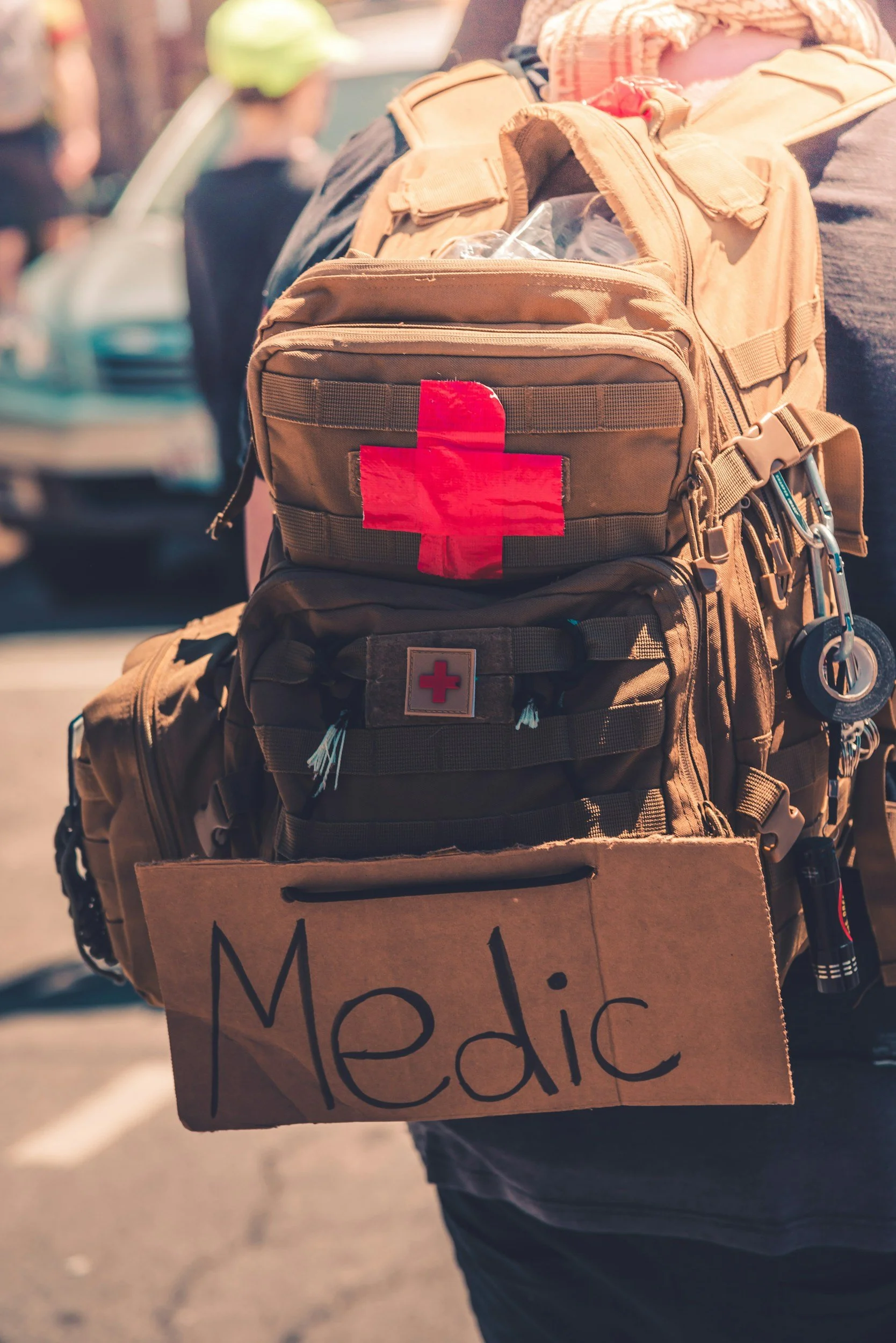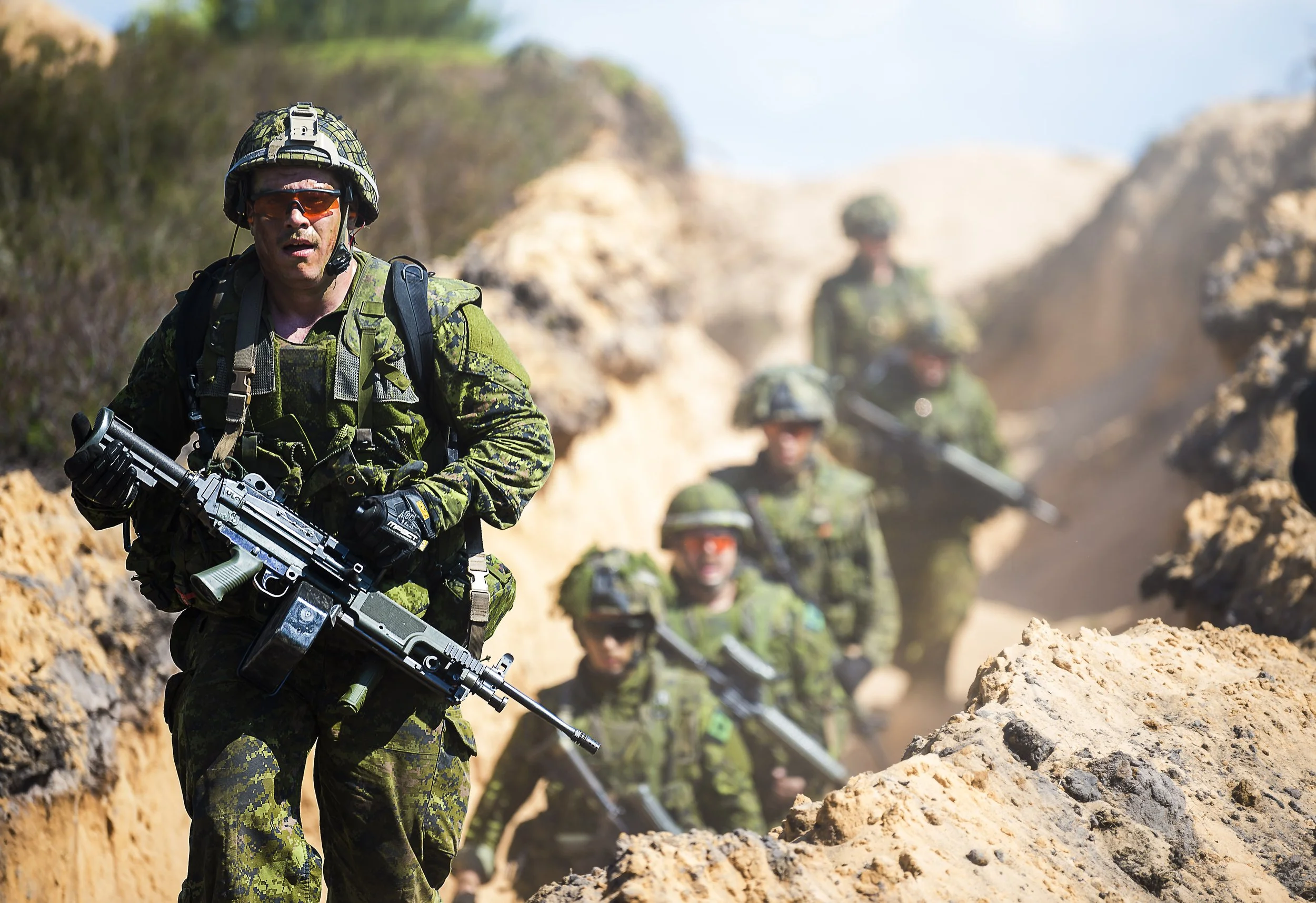Insights
Home / Publications / Insights
2026
Volume 6 - Issue 9
Enabling Human Security through Whole-of-Government Operations: Afghanistan 2010–2011
Howard Coombs and Katherine Rossy
February 23, 2026
Volume 6 - Issue 8
Putting humanity at the front and centre of security: impactful and timely humanitarian action in Red Cross’ responses
Kelsey Lemon, Sophie Rondeau and Karyn Stone
February 9, 2026
Volume 6 - Issue 7
Citizenship Revocation for Terrorism and its Impact on a Human Security Approach to Counterterrorism
Maarten Bolhuis
January 21, 2026
Volume 6 - Issue 6
Climate Change as a Threat Multiplier for Cybersecurity: Human Security Lessons from Canadian Scenario Planning
Andrew Heffernan, Chelsea Dunn, Claire Parsons, and Kenzie O’Day
January 8, 2026
2025
Volume 6 - Issue 5
Connecting Emerging Technology and Human Security: The Case of Quantum S&T
Michael Murphy
December 10, 2025
Volume 6 - Issue 4
The Duty to Destroy: Russian Identity Formation and Human (In)Security in Mariupol
Ian Garner
November 25, 2025
Volume 6 - Issue 3
Revisiting Military Models in Support of Human Security
Michael A. Rostek
November 13, 2025
Volume 6 - Issue 2
More than Meets the Eye: The Canadian Armed Forces and Human Security - Visiting Defence Fellows’ Perspective
Adam Moore, Kris Purdy and Drew Lanier
November 5, 2025
-
Volume 5 - Issue 11 | June 27, 2025
Human Security: Understanding Military Roles and Human (In)Security in War-Torn Areas - Rachel Grimes, Clare Hutchinson, David Lambert, Sarah Jane Meharg
In recent years, the lines between the “hard issues” of national security and “soft issues” of human security have blurred. Hard issues of security that are directed towards state security are seen as “military defence of state interests and territory… (read more)
_____________________________
Volume 5 - Issue 10 | June 11, 2025
Shaping Peace in a Complex World: Anthroplogical Perspectives on War and Women’s Agency - Emilie El Khoury
At the core of discussions across all panels, the focus was to figure out the best way to understand how to interact and communicate appropriately with local populations, whether they are seeking help or considered to need assistance. (read more)
_____________________________
Volume 5 - Issue 9 | May 30, 2025
In Case of Shifting Polarity, Break Glass: Security Studies in an (Un)Changing World - Michael Murphy
In response to this changing security environment marked by the shift to a new multipolarity, there is increasing attention on the readiness of our conceptual tools. (read more)
_____________________________
Volume 5 - Issue 8 | Apr. 23, 2025
Observations from Canadian Army Futures Work and the (Un)Changing Character of War: Extremism and Maximalism 2016-2024 - Robert Addinal, Ali Dizboni, Peter Gizewski
Given geopolitical events between 2017 and 2023, one of the future worlds, Global Quagmire, drew our interest in the above context. A number of the characteristics of Global Quagmire resemble recent developments; it includes a failure to effectively implement solutions… (read more)
_____________________________
Volume 5 - Issue 7 | Apr. 11, 2025
China’s Strategic Turn and Its Logic - Yixu Zhou
China has undergone rapid development in the past decades as a result of reform and opening-up under former Chinese leader Deng Xiaoping. Jiang Zemin and Hu Jintao to some extent stuck to the Deng Xiaoping’s policy of taoguang yanghui or “keeping a low profile,”… (read more)
_____________________________
Volume 5 - Issue 6 | Mar. 18, 2025
War Crimes in Real Time: Hostile Actors, Citizen Journalism and Disinformation Campaigns in Hybrid War- Katherine Rossy
Modern hybrid wars are waged by a panoply of actors who use violent and non-violent methods, such as the weaponization of technology, to achieve their ends. These actors, both friendly and hostile, generate competing narratives within the virtual information landscape. (read more)
_____________________________
Volume 5 - Issue 5 | Feb. 28, 2025
Russian Hybrid War vc. Clausewitz’s “Ideal War” - Leonid Davydenko
Russo-Ukrainian War is regional in terms of territory but not in terms of its influence on the global geopolitics and the development of hybrid war theory. (read more)
_____________________________
Volume 5 - Issue 4 | Feb. 13, 2025
A Different Look at the Un-Changing Nature of Intelligence - James Cox
The study of intelligence is an essential element, or should be, in all research related to war and warfare. Consider that when classified material dealing with the Ultra traffic in the Second World War, revealed by Frederick Winterbotham in 1974 (read more)
_____________________________
Volume 5 - Issue 3 | Jan. 22, 2025
Robotic Kraken: Trends in Uncrewed Maritime Systems - Robert Martyn
On January 28, 2024, an Uncrewed Aerial Vehicle (UAV) attacked a military base near the Syrian border in Jordan, resulting in the deaths of three U.S. soldiers and injuries to over 40 other service members. (read more)
_____________________________
Volume 5 - Issue 2 | Jan. 3, 2025
Women, Peace and Security Applications in the AF - Sonal Gupta
WPS invites an alternative perspective on conflict management through a demilitarised, gender-progressive lens and is next in the human security continuum. (read more)
_____________________________
Volume 5 - Issue 1 | Dec. 6, 2024
Proportionality in Context: The Dichotomy Between “Legitimate” and “Lawful” in Targeting - Phillip Drew
This paper is an examination of the complimentary yet different roles that legitimacy and legality play in the decision-making process during armed conflict. (read more)
-
Volume 4 - Issue 3 | Oct. 1, 2024
The Climate Crisis: A Framework for Western Hemispheric Cooperation - Pablo Cardona
With the return of conventional conflict, Western liberal democracies have reluctantly embraced the importance of strategic alliances and capability-sharing. (read more)
_____________________________
Volume 4 - Issue 2 | Jul. 10, 2024
CANUS in the High North: Avenues of Canadian and U.S. Cooperation in the Arctic - Allison Brown
The rapidly changing High North presents both opportunities and challenges that necessitate closer cooperation between Canada and the United States (CANUS). (read more)
______________________________
Volume 4 - Issue 1 | Apr. 30, 2024
The Canadian Armed Forces and Domestic Disaster Relief in the Context of Climate Change - 2Lt Jieun Lee
The Canadian Armed Forces (CAF) plays a key role in Humanitarian Assistance and Disaster Relief (HADR) operations at home. Specifically, the CAF is well-known for its involvement in two major weather… (read more)
______________________________
Volume 3 - Issue 2 | Apr. 21, 2023
Indigenous Peoples and Arctic Security: Building Partnerships to Secure the North American Arctic. - Dr. James R. Morton
A U.S. Special Forces team links up with a local Alaska Native person who will guide it to a long-range radar station along the most northern coastline of Alaska. The temperature is a bitter -40 degrees… (read more)
______________________________
Volume 3 - Issue 1 | Apr. 10, 2023
Clear Communications and Solid Foundations: The principles of decision-making in Arctic defence - Dr. Thomas Hughes
…the Arctic is coming under greater scrutiny and drawing considerable political attention. In line with this, there is no shortage of discussion and opinion on policy and activities that are occurring in the.… (read more)
-
SOF Hyper-Connected and Hyper-Enabled Technology: SOF’s Strength or SOF’s Achilles’ Heel? - Col (Ret’d) Derek Jones and LTC (Ret’d) Dan Leaf
Technology has historically provided significant advantages for Special Operations Forces (SOF). The two decades after 9/11 witnessed the emergence of myriad technologies that enabled… (read more)
____________________
Getting the Joint Force and NATO ready to defend the Arctic - John Behrmann, Lon Strauss and Njord Wegge
As tensions in the Arctic is on the rise, questions related to NATO’s ability to defend its northern flank has re-emerged in several European and North American capitals. (read more)
____________________
How Israel Tried to Stop Iran’s Nuclear Program - Dr. Ehud Eilam
Israel and Iran used to be allies, until 1979. Since then, following the Islamic revolution, Iran sees Israel as its arch - enemy. Iranian leaders had threatened over and again to destroy Israel. (read more)
____________________
Strong, Secure, Engaged: A Policy without a Strategy - Absent a roadmap, there should be no expectation of reaching the destination -Colonel Trevor Teller
Canada cannot independently safeguard itself or conduct military kinetic operations – it needs its allies and is not able to go it alone. (read more)
____________________
The Polish Territorial Defence Forces (POL TDF) – a significant component in national resilience and resistance. - Brigadier General Maciej Klisz
This paper characterizes and explains the role, mindset, training, and "out-of-the-box" approach used by the Polish SOF personnel that were selected to establish the Polish Territorial Defence Forces. (read more)
____________________
Israeli Special Operations Forces- An Overview - Eitan Shamir and Eyal Ben-Ari
The origins of Israel’s Special Operations Forces predate the establishment of the state in 1948. Under the Ottoman Turks, Jewish settlers began establishing local defense organizations such as "Hashomer" (the Guard) who adopted Bedouin customs, wore Bedouin outfits and preferred to fight on horseback. (read more)
____________________
Military Lessons of the Influenza Pandemic of 1918 - Howard G. Coombs, PhD
The influenza pandemic, otherwise known as the “Spanish Flu,” of 1918 had three successive waves and killed about 50 million people in only a couple of years. To put this outbreak into context, it resulted in more deaths than the entirety of the First World War. (read more)
____________________
Landforce Implications of the COVID-19 pandemic: A Korean Perspective - Professor LIM, Yoonkap
Taking stock of the COVID-19 pandemic since 2020, the international community has experienced shock and awe. While a return to normalcy still remains uncertain Armed forces have continued to play a role in preventing war as well as protecting countries and their population (read more)
____________________
Telecommuting in the Canadian Armed Forces: A Case for Deliberate Implementation - Major Stephanie C. LeBlanc, CD, A de C
At the outset of the COVID-19 pandemic, the Canadian Armed Forces (CAF) had to rapidly adapt to limit disruption to its routine activities and operations. The CAF shifted from a nearly exclusively… (read more)
____________________
The Canadian Army and the Pandemic: Deployment, Training and Command perspective - MGen Saint-Louis
This KCIS Insight offers an analysis of the pandemic’s impact on the Canadian Army from a command perspective, as experienced across three different leadership positions. (read more)
____________________
The Role of the Military in New Zealand’s Response to COVID - Bethan K. Greener
The New Zealand government adopted a “go hard and go early” elimination strategy regarding the Covid-19 pandemic after the first active case in the country on 28 February 2020. Borders were closed on 19 March and an alert level system introduced on 21 March that ranged from Level 1 (no restrictions) to... (read more)
____________________
Narrative Statecraft: A Primer for Special Operations - David C. Ellis, PhD
This policy paper explores a significant, but understudied, component of irregular warfare, namely, narrative statecraft. It begins with an overview of the concept of the “state”, provides a definition of narrative, and then elaborates on the instrument of narrative statecraft in a special operations context.. (read more)
-
The Question of SOF Culture - Erin Yantzi
The purpose of this paper is to advocate for when and why SOF leadership and policy-makers, along with researchers, should study SOF culture by examining what is meant by “culture”; it will then highlight possible approaches by contrasting two recent case studies of SOF cultures in Norway and Australia. (read more)
_____________________
CANADIAN SPECIAL OPERATIONS FORCES COMMAND (CANSOFCOM): A Leaders Perspective on Great Power Competition and SOF Integration - Brigadier-General Steve Hunter
While Western military forces have been consumed with counterterrorism and addressing violent extremism since 11 September 2001, global power structures have undergone a significant shift, resulting in challenges to the rules-based international order and...(read more)
_____________________
BELSOF: Quo Vadis?- Colonel Tom Bilo
Following substantial equipment modernizations, the Belgian armed forces will be undergoing a major evolution. Among the many evolving capabilities, the Special Operations Forces (SOF) are at the forefront of a true capability transformation.(read more)
_____________________
Adapting Special Operations Forces Employment in Great Power Competition: Reflections on the future of Canadian Special Operations Forces - Gaëlle Rivard Piché and H. Christian Breede
Following the attacks of September 11, 2001, special operations forces (SOF) became the force of choice for decision makers in in the ensuing 9/11 Wars...(read more)
_____________________
The Arctic at the Operational Art: Planning and Leadership Considerations for Arctic Security - D. Craig Aitchison and H. Christian Breede
Recent defence policies, punditry, media attention as well as profound changes to the climate have raised the profile of the Arctic region in the minds of Canadians. Talk of potential stocks...(read more)
_____________________
Beyond Direct Action: A Counter-Threat Finance Approach to Competition - Sara Dudley, Kevin D. Stringer and Steve Ferenzi
China and Russia seek to advance their revisionist agendas and threaten Western security by operating below the threshold of armed conflict. This isn’t a new idea, but adversary use of economic statecraft and financial warfare specifically remain gaps in military...(read more)
_____________________
Special Operations Forces in Great Power Competition - Kevin D. Stringer and H. Christian Breede
For almost two decades, defence policy discussions on the employment of special operations forces (SOF) have focused on their role in the irregular fight typified by places like Iraq, Afghanistan, and regions farther afield...(read more)
_____________________
KCIS: A Way Ahead - Kim Richard Nossal
Every year since 2006, KCIS selected a timely theme in international security to explore, bringing together a range of practitioners, policy-makers, academics, and students to examine the issue and the policy implications for the United States, Canada, and our transatlantic allies..(read more)









